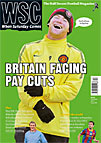 Dear WSC
Dear WSC
I would like to ask my fellow readers if their clubs have something called “The Nardiello Factor”. The Nardiello Factor is a phenomenon where a striker’s popularity is based in a large part on the exotic nature of his name. At Barnsley we have seen no finer example of this than in recent months with the arrival of Jerónimo Morales Neumann. My fellow Tykes have been beside themselves at the thought of this player, and have wondered how Mark Robins can possibly limit him to just warming the bench. This opinion seems based on nothing more than the fact that he has a name that would be good to shout out when (if) he scores. Our Jerónimo accordingly scores a Nardiello Factor rating of nine (the maximum score is ten). Contrast this with Chris Woods, our loanee from West Brom. He scores a paltry NarFac rating of four. Were he to slightly change his name to Christiano Woodaldo he would up his NarFac rating to eight but, alas, this is not to my knowledge due for consideration. As a consequence the support from the terraces has been a little limited to date. Liam Dickinson scores a NarFac rating of one, though I am willing to concede that, even if he changed his name to Galileo Figaro Magnifico, he’d do well to register a NarFac rating of five. His yellow boots have had a negative impact.
Ian Marsden, Belper
The Archive
Articles from When Saturday Comes. All 27 years of WSC are in the process of being added. This may take a while.
 After a torrid start to the 2010/11 season under new manager Roy Hodgson, surely it is still too early to be calling for his head
After a torrid start to the 2010/11 season under new manager Roy Hodgson, surely it is still too early to be calling for his head
A team packed with experienced players makes a poor start to the season. Frustrated fans turn on the new manager who, they say, doesn’t understand the culture of the club and demand that he be replaced by a legendary former player. The club’s board act upon the advice yelled at them from the stands and bring back the legend. Things get worse and the club ends up getting relegated.
 Dear WSC
Dear WSC
Congratulations on the article about match-fixing (Crimes and misdemeanours, WSC 283). Paul Joyce did a superb job reviewing the many different cases of corruption in European football. As the German police investigation began, partly because of the controversy around my book, The Fix, I did want to take him up on one issue. He mentioned that “Germany lies second in the match-fixing table” – this is true but it is not because corruption is more prevalent in German football. Rather it is because the German authorities are now, after years of denial, actually taking the issue seriously and are vigorously investigating match-fixing – and the more they investigate, the more they find. This proactive attitude is in stark contrast with British football authorities who seem to have adopted the attitude of “don’t know, don’t want to find out”. The circumstances in British football are similar to other European countries: thousands of relatively badly paid players; lots of poor clubs and lots of interest in the gambling markets. However, the British authorities have not yet fully woken to the dangers. I can only hope that they do before they discover a similar problem to the one in Europe.
Declan Hill, Oxford
 Simon Tyres rises early on a Sunday morning to review the football-related programming
Simon Tyres rises early on a Sunday morning to review the football-related programming
Sunday morning television is an odd thing. If it’s not soap omnibuses or Tim Lovejoy operating a whisk, trying desperately to make out that this is how he saw his career going all along, it’s ethical debate shows in the old God slot featuring panellists chosen for their lightness towards universal tolerance. Turning on BBC1 to find Terry Christian taking the moral high ground, any moral high ground, makes you wonder if the last two decades of broadcasting progress were in vain.
 Seb White looks back over the season where Gary Johnson’s insatiable Yeovil Town strolled to succes
Seb White looks back over the season where Gary Johnson’s insatiable Yeovil Town strolled to succes
The long-term significance
In the summer of 2002 the Football League finally approved an extra promotion/relegation place between the top tier of non-League football and Division Three. In 1987 the controversial election process had been replaced with one promotion and relegation spot between the two. Strict ground regulations saw three clubs in the mid-1990s being denied promotion, this and the increasing good fortune of non-League sides in the FA Cup saw a clamour for change.
The decision to increase movement between the divisions has been vindicated with all the teams that finished in the top six this season now members of the Football League. Three other sides – Barnet, Stevenage Borough and Burton Albion – have also made the step up. The extra promotion place has also done those relegated from the Football League a favour with Shrewsbury Town, Carlisle Utd, Exeter City and Torquay Utd all returning via the play-offs.